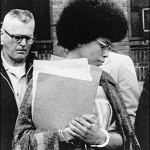"8-year-olds gettin' found with nine-mils..."
--Mos Def, "Mathematics
It's a reminder of how America fails black children on multiple levels. Late August and early September were the anniversaries of two 1994 murders of children by children-- Shavon Dean, 14, and Robert "Yummy" Sandifer, 11-- in Chicago. Yummy, so called because of his love of snack food, was accused of murdering Dean, an innocent bystander, on August 28, 1994, during a shooting spree that Yummy reportedly did to join a street gang, the Gangster Disciples. Days later, on September 1, Yummy was himself found shot to death, execution style, beneath a Chicago viaduct. Two Gangster Disciplines who had reportedly been harboring Yummy, brothers Cragg Hardaway, 16, and Derrick Hardaway, 14, were later convicted of Yummy's murder.
 |
| Shavon Dean |
As many newspapers and magazines noted at the time, the tragedy of a web of murder with children as the only participants demanded attention. It would be a haunting prediction of the unparalleled levels of violence seen in Chicago in recent years. But, as Gregory Caldwell's unpublished dissertation manuscript discusses, the way the media framed Yummy as a pathological figure--someone who can't be saved and must be eradicated-- was, in itself, part of the process of how subjects like Yummy are formed.
Exemplifying the tone of the coverage, the Time magazine issue of September 19, 1994, ran the cover story “Murder in miniature“ with the face of 11-year-old Robert “Yummy” Sandifer staring out from the cover. The title read “The Short,Violent Life of Robert “Yummy” Sandifer, So Young to Kill, SoYoung to Die.” The origin of the photograph is unclear, but it appears to be a mug shot. The corn row hair braiding, dark skin, and emotionally vacant face of the young Sandifer constructs a “miniature” version of the Black “gangsta” that had come to ubiquitously signify youthful Black masculinity by mid the 1990s.
For the writers at Time, “Yummy” was the latest in an ongoing mediated representation of the irredeemable Black, child or adult. Even in childhood, blackness marked “Yummy” as being beyond the power of humanity to (re)form. This is an argument that echoes the rhetoric of Charles Murray and Richard Herrnstein in their infamous assault on the intellectual capabilities of Blacks, The Bell Curve : Intelligence And Class Structure In American Life (Herrnstein and Murray), where they argue that black children lack the cognitive abilities of white children and therefore should be discouraged from reproduction. Being born bad, impossible to socialize, a born menace, Robert “Yummy” Sandifer and children like him posed a special threat to American civil society, according to right-wing social scientists and social critics. By 1995, John J. Dilulio Jr. had developed the thesis of the “Super Predator” in the Weekly Standard article “The Coming Of The Super-Predators”(Dilulio).Yummy was used by conservatives to cut the social safety net and replace it with the prison dragnet, and he was used by liberals to point out the need for their social interventions in Black communities. Yummy's short life became a symbol for the pathology of street gangs, but, as Caldwell's analysis says, before we make a symbol of an 11-year-old kid, we should ask what forces shaped him. It matters that Yummy had been abused from a very young age and was likely without adequate adult supervision his entire life. It matters that crack cocaine, a drug introduced to Black communities by agents working on behalf of the US government, had destroyed his family and community. Yummy's life could serve as a reminder to stop pathologizing Black children, to understand how children could be involved in a web of murder that took the innocent life of Shavon Dean, that set Yummy up to never really live the life of a child. Instead, his case goes unremarked. And obviously, the pathologizing continues. Black pathology is the grounding assumption of laws like "stand your ground" and the school-prison connection.
Caldwell shows that even the ways we speak or write about Black children are part of the forces that shape Black children. He reminds us that subjects like Yummy don't just come out of nowhere. They are shaped by specific sets of political, economic, geographic, legal, psychological, and social forces, including the very media that comments on them and makes them out to be "Super Predators" who are born "ready to die."
 |
| The Notorious BIG's first album was titled Ready to Die and featured an image of a Black baby in diapers. |
People are all-too ready to say that rap music isn't just a commentary on violence in the community but is part of a "culture of violence" that is largely to blame for that violence. But they are never ready to say that non-Black commentators on Black youths are part of America's culture of violence against Black people.
That's bullshit.
It assumes that Black people have power over the contexts we are shaped in. But if being an oppressed or persecuted group means anything, it means that such power is precisely what we do not have. Consider geography as just one example. We largely live in segregated neighborhoods and food deserts, but it's not because we only want to live around other Black folks just because. These neighborhoods are also largely places of deprivation where we are underserviced by local governments, medical institutions, the private sector, and, especially, schools. And we live there because we don't possess the power to determine who we live and raise our families near. Realtors, developers, planners, and legislators largely shape the geographies in which we negotiate our lives. We make the best out of the scraps we are given. But don't get it twisted: We are given the leftovers after the corporations and circulating desires of white gentrifiers and the police have staked their claims. We live in the narrow spaces that those other sets of white interests do not desire. And these spaces are largely bad for us. They are, in fact, killing us. Ghettos, in and of themselves, are acts of violence against the people who live in them. And Black children largely grow up and live out life in these spaces.
So, when we talk about the criminal activities of Black youths, we are also talking about the contexts in which they are shaped as subjects, contexts over which they have no power, contexts that are aimed at destroying them. And when we pathologize Black youths, we are assisting that genocidal context.
Yummy killed Shavon, and the murder of a Black child must be prevented if Black people are going to survive. When it happens, it must be called out and mourned. And if a community organizes itself around anything, it must organize around threats to the survival of its members. But part of that organizing entails correctly diagnosing the problem. If we focus on Yummy as the source of the problem, we pretend that a Black child is to blame for all the ills of the Black community that set his life on the course to kill another Black child in the first place. And to blame Black youths for the conditions in which they are formed, we would have to ignore the larger structural forces of antiblack racism that make Black communities the kinds of places that produce youths who can murder other Black youths at the age of 11. Not only that, but in blaming Yummy for how he was formed, we would have to become part of the problem of antiblackness. And that is the fundamental problem.
Let's be clear: Blameworthiness is not a feature of childhood for any other group of people except Black people. We don't have to cling to the old notion that children are "innocent"-- whatever that means or ever meant. We just have to acknowledge that no other group is blamed for as many of the problems of life in modern society as Black youths are, even though no group is as powerless in modern society as Black youths are. Non-Black people who blame Black people for the problems we face-- and the Black people who echo them-- need to shut the fuck up because they are part of the problem. They've had their day. They've had hegemonic control over the media surrounding Black youths. You Google "Black youths" and most of what comes up will be about what they, the pathologizers, said about Black youths. And we are where we are largely because their commentary has been part and parcel of the apparatuses arrayed against us. In previous times, they have helped justify the 100-to-1 powder-to-crack cocaine enforcement disparities and mandatory minimums. Who knows what they'll think up next? I'm not even sure they think. Mostly, they just react from an affect of fearfulness toward Black people and Black youths specifically.
We, Black commentators who are students of Black freedom struggle, have to radically reshape our approach to describing the panoply of problems Black youths must confront before they are even born, problems over which they couldn't possibly have control. Caldwell reminds us that we have to develop an ethic for how we talk about Black life. That ethic must be part of our efforts to take back our communities.
"Stop Being Cowards and Let's Have a Revolution"
The larger media narrative routinely places Black youths as the cause of the problems they face. But within the Black community, there are forces at work attempting to reshape these narratives and encourage Black youths to enjoy childhood, educate themselves, and move to the next level the best way they can. There is a way to ethically talk about the problems Black youths face without pathologizing Black youths.
Tupac Shakur was interested in the story of Robert "Yummy" Sandifer. Shakur dedicated his song "Young Niggaz" to Sandifer "And all other lil' young niggas that's in a rush to be gangstas." Tupac hoped to discourage youths from running in the streets like Yummy did, but he did so without giving in to the larger media narrative of Black youth pathology. In 1995, Tupac also did a very significant and underappreciated interview while incarcerated at Clinton prison in New York state in which a large image of Yummy is prominently displayed behind him, seeming to gaze expectantly at Tupac and the viewer, a gaze that, as Caldwell suggests, looks like the "vacant," thousand-yard stare of an adult with post-traumatic stress disorder who is on the verge of exploding. In the interview, Tupac elaborates a larger political vision for how gangs and musicians could help the community: "Now, if we do wanna live the thug life and the gangster life and all of that, okay, so stop being cowards and let's have a revolution" (18:59).
 |
| Tupac Shakur with a photo of Robert "Yummy" Sandifer in the background |








